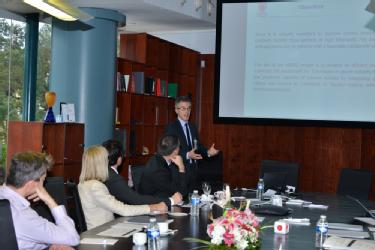EMBARGO: 10 February 2016 - 15:00 CET
Sophia Antipolis, 10 February 2016 – The ESC is delighted to announce its decision to choose five, instead of four recipients, of its newly established Grants for Medical Research Innovation.
The grant programme, sponsored exclusively by Boehringer Ingelheim (BI), aims to stimulate worldwide research in cardiovascular medicine.
“We were astounded at the quantity and quality of the proposals submitted. The judges had an extremely difficult task, even selecting five winners instead of four as originally planned”, said Professor Francesco Cosentino from Karolinska, Stockholm, the chairperson of the programme’s Scientific Committee. “With one in four people dying as a result of thromboembolic disease, innovative research in this field is urgently needed. We look forward to supporting the winners to advance knowledge in this important area."
Grant awardees are:
- Michael Joner, MD from CVPath Institute in Gaithersburg, Maryland, USA, and Deutsches Herzzentrum München, Munich, Germany
- Christina Christersson, MD, PhD, from Uppsala University, Uppsala, Sweden
- José Manuel Soria Fernandez, PhD, from Institute of Biomedical Research - Hospital de la Santa Creu i Sant Pau (IIB-Sant Pau),, Barcelona, Spain
- David-Alexandre Trégouët, PhD, from the Pierre & Marie Curie Medical School, Paris, France
- Timo Heidt, MD, from Heart Center Freiburg University, Freiburg, Germany
“We are absolutely thrilled and happy to be awarded one of these prestigious grants,” said Dr. Joner, whose research will investigate systemic versus site-targeted treatment of neoatherosclerosis, “a novel disease manifestation of atherosclerosis, and one of the most intriguing issues in interventional cardiology,” he noted. “Our study is designed to compare local site-targeted treatment of neoatherosclerosis, using fully bioresorbable stents, with a systemic approach applying high-dose statin treatment in a novel animal model of in-stent neoatherosclerosis.”
“We are honored to receive this grant which will enable us to evaluate the future risk of thromboembolic and bleeding events after different treatments for aortic stenosis,” noted Dr. Christersson. “Today we have different options for antithrombotic treatment after bioprosthetic aortic valve replacement. This observational study may increase our knowledge of how different combinations of antithrombotic drugs after bioprosthetic aortic valve replacement impact short and long term outcome.”
“Our group has pioneered the development of a predictive tool for thromboembolic risk in the general population and this grant will advance its translation to cancer patients,” commented Dr. Soria Fernandez. “It is critically important to improve current predictive tools to precisely identify those patients at high thrombotic risk and administer anticoagulants only to patients with a favorable risk/benefit ratio. We hope the results of our project will contribute to personalised decision-making regarding thromboprophylaxis, and ultimately reduce the high rates of thrombosis-related morbidity and mortality of cancer patients.”
 “This ESC research grant will allow us to conduct the first comprehensive epidemiological investigation of plasma microRNAs with respect to venous thromboembolism (VTE) and its risk of recurrence,” explained Dr. Trégouët. “We anticipate that this project would provide caregivers with a diagnostic tool derived from plasma microRNAs biomarkers that will guide them in adapting patients' anticoagulant therapy with two objectives: decreasing the bleeding complications and cost associated with unnecessary treatment of low risk patients; and decreasing the recurrence rate of VTE. "
“This ESC research grant will allow us to conduct the first comprehensive epidemiological investigation of plasma microRNAs with respect to venous thromboembolism (VTE) and its risk of recurrence,” explained Dr. Trégouët. “We anticipate that this project would provide caregivers with a diagnostic tool derived from plasma microRNAs biomarkers that will guide them in adapting patients' anticoagulant therapy with two objectives: decreasing the bleeding complications and cost associated with unnecessary treatment of low risk patients; and decreasing the recurrence rate of VTE. "
“This grant will support our project to translate molecular coronary imaging of plaque inflammation into a porcine model,” said Dr. Heidt. “Novel developments in magnetic resonance (MR) imaging, for example, catheter tracking and contrast agents that selectively target cellular epitopes associated with plaque inflammation or minor plaque rupture, might enable MR-navigated targeted plaque-sealing with non-metallic bioresorbable vascular scaffolds (BVS),” he explained.
According to ESC President, Professor Fausto Pinto,
"The ESC has a major commitment to support cardiovascular research. These grants supported by Boehringer Ingelheim are an excellent example of transparent partnership between industry and the scientific world. Supporting this research is helping peoples’ lives."
ENDS

 Our mission: To reduce the burden of cardiovascular disease.
Our mission: To reduce the burden of cardiovascular disease.